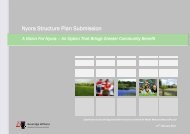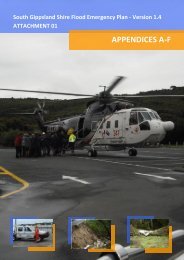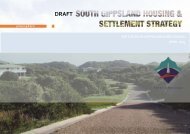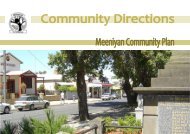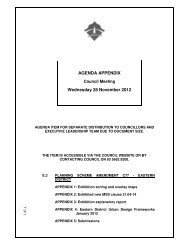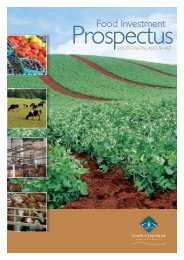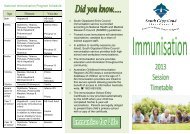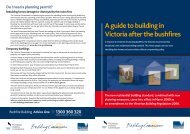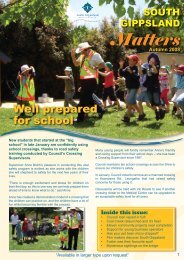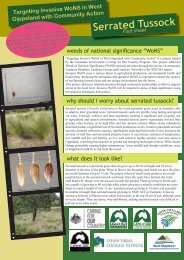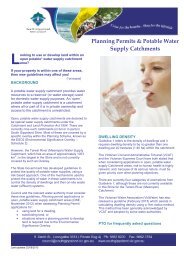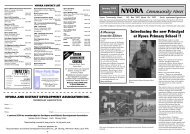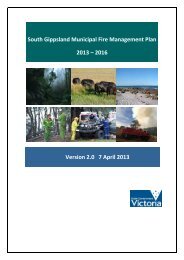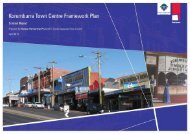Active Ageing Plan - South Gippsland Shire Council
Active Ageing Plan - South Gippsland Shire Council
Active Ageing Plan - South Gippsland Shire Council
You also want an ePaper? Increase the reach of your titles
YUMPU automatically turns print PDFs into web optimized ePapers that Google loves.
<strong>South</strong> <strong>Gippsland</strong> <strong>Shire</strong> <strong>Council</strong><br />
<strong>Active</strong> <strong>Ageing</strong> <strong>Plan</strong><br />
2012 - 2016
Table of Contents<br />
Executive Summary ............................................................................................................................................................................................................................................................................. 1<br />
1. Overview of <strong>South</strong> <strong>Gippsland</strong> <strong>Shire</strong> ................................................................................................................................................................................................................................ 2<br />
2. Introduction....................................................................................................................................................................................................................................................................................... 3<br />
3. Why an <strong>Active</strong> <strong>Ageing</strong> <strong>Plan</strong> ................................................................................................................................................................................................................................................ 4<br />
3.1 Policy Context ................................................................................................................................................................................................................................................................. 4<br />
3.2 Regional initiatives on ageing .............................................................................................................................................................................................................................. 7<br />
4. Local Picture .................................................................................................................................................................................................................................................................................... 8<br />
4.1 Demographics ................................................................................................................................................................................................................................................................. 8<br />
4.2 Health and Wellbeing Profile ................................................................................................................................................................................................................................ 8<br />
4.3 Diversity within the Older Population .............................................................................................................................................................................................................. 8<br />
5. Relationship to other <strong>Council</strong> <strong>Plan</strong>s and Strategies ............................................................................................................................................................................................. 9<br />
6. Methodology ................................................................................................................................................................................................................................................................................. 11<br />
7. <strong>Council</strong>’s responsibilities to the older residents ................................................................................................................................................................................................... 13<br />
8. Strategies to address issues of importance to our older residents 15<br />
8.1 Social Environment– A vibrant engaged community ........................................................................................................................................................................ 15<br />
8.2 Natural Environment- A sustainable environment ............................................................................................................................................................................... 15<br />
8.3 Economic Environment- A strong economy ............................................................................................................................................................................................ 15
Table of Contents (cont'd)<br />
8.4 Built Environment-Appropriate infrastructure ......................................................................................................................................................................................... 15<br />
8.5 Leadership- A leading organisation .............................................................................................................................................................................................................. 15<br />
9. Monitoring and Evaluation .................................................................................................................................................................................................................................................. 16<br />
Action <strong>Plan</strong><br />
Social Environment: A vibrant engaged community ................................................................................................................................................................................................. 17<br />
Natural Environment: A sustainable environment ...................................................................................................................................................................................................... 23<br />
Economic Environment: A strong economy .................................................................................................................................................................................................................. 25<br />
Built Environment: Appropriate infrastructure .............................................................................................................................................................................................................. 29<br />
A Leading Organisation .................................................................................................................................................................................................................................................................. 32<br />
Acronyms & Definitions ................................................................................................................................................................................ 35<br />
Acknowledgements ...................................................................................................................................................................................... 39<br />
References .................................................................................................................................................................................................. 40<br />
Appendix 1 ................................................................................................................................................................................................... 42<br />
Appendix 2 ................................................................................................................................................................................................... 43
Executive Summary<br />
The ageing of the population is a worldwide phenomenon due to decline in birth rates and an increase in life spans and not (as is often thought) solely<br />
contributed to by the ageing of the baby boomers! The age structure of countries will therefore change significantly. This change brings both<br />
opportunities and challenges. Some of these challenges are already present and will only exacerbate without careful strategic planning at all levels of<br />
Government.<br />
Australia is following this same trend and at the local level, by 2031 the projected population of people aged 60 and older will constitute 25% of the<br />
<strong>South</strong> <strong>Gippsland</strong> population. This percentage is higher than that projected for both <strong>Gippsland</strong> and Victoria.<br />
Local Government is in a prime position to take a lead in strategic planning for an ageing community. <strong>South</strong> <strong>Gippsland</strong> <strong>Shire</strong> <strong>Council</strong> (SGSC) has<br />
many strategic plans that contain strategies and actions that are relevant to the community. The <strong>Active</strong> <strong>Ageing</strong> <strong>Plan</strong> (AAP) 2012-2016 focuses on<br />
addressing issues that older residents have said are important in enabling them to participate in the community as they age.<br />
The level of participation in the community is often dependent on the level of physical and cognitive ability of people. Maintaining health and wellbeing<br />
as we age is therefore integral to continuing participation. It is now acknowledged that health and wellbeing is affected by factors originating across<br />
any or all of four environmental dimensions (DoH 2012). These are Social, Economic, Built and Natural. The strategies in the action plan are<br />
grouped under the four environments of health as well as a heading of ‘Leadership’ consistent with the headings of the <strong>Council</strong> <strong>Plan</strong>. These are:<br />
1. Social - A vibrant engaged community<br />
2. Natural Environment - A sustainable environment<br />
3. Economic Environment - A strong economy<br />
4. Built Environment - Appropriate infrastructure<br />
5. Leadership - A leading organisation<br />
The AAP consists of two sections. Section one discusses the main opportunities and challenges presented for an ageing population at global,<br />
national, state and local levels and the process of the development of the <strong>Plan</strong>. Section two is the Action <strong>Plan</strong> which details the strategies, actions,<br />
measures, responsible officers/ partners and timelines for completion of each action.<br />
There are sixteen strategies and forty-three actions in the <strong>Active</strong> <strong>Ageing</strong> <strong>Plan</strong> to address the issues identified from the consultation process. The<br />
implementation of the action plan will be monitored by the <strong>Active</strong> <strong>Ageing</strong> <strong>Plan</strong> 2012-2016 Steering Group. Evaluation of the actions will be via a<br />
survey of older residents to measure any improvement to their participation levels that can be attributed to the strategies within the <strong>Active</strong> <strong>Ageing</strong><br />
<strong>Plan</strong>.<br />
<strong>South</strong> <strong>Gippsland</strong> <strong>Shire</strong> <strong>Council</strong> <strong>Active</strong> <strong>Ageing</strong> <strong>Plan</strong> 2012-2016 1
1. Overview of <strong>South</strong> <strong>Gippsland</strong> <strong>Shire</strong><br />
The current population of <strong>South</strong> <strong>Gippsland</strong> <strong>Shire</strong> is approximately 27,776, making up 10.7% of the <strong>Gippsland</strong> region.<br />
<strong>South</strong> <strong>Gippsland</strong> <strong>Shire</strong> spreads across 3,280 square kilometres of farming and coastal landscape. The <strong>Shire</strong> consists of 26 settlements, including the<br />
four major townships of Foster, Korumburra, Leongatha and Mirboo North.<br />
<strong>South</strong> <strong>Gippsland</strong> <strong>Shire</strong> has a strong dairy and beef industry with economic development also strong across horticulture, forestry, fishing, boutique<br />
food and wine, retail trade, manufacturing and tourism. With magnificent natural surrounds there is strong interest in the environment and the arts for<br />
recreation.<br />
<strong>South</strong> <strong>Gippsland</strong> <strong>Shire</strong> <strong>Council</strong> <strong>Active</strong> <strong>Ageing</strong> <strong>Plan</strong> 2012-2016 2
2. Introduction<br />
The <strong>South</strong> <strong>Gippsland</strong> <strong>Shire</strong> <strong>Council</strong> (SGSC) <strong>Active</strong> <strong>Ageing</strong> <strong>Plan</strong> (AAP) 2012-2016 is a demonstration of <strong>Council</strong>’s ongoing commitment to ensure that<br />
the older residents of our community participate in community life and are valued for their knowledge, wisdom and life experiences.<br />
A draft ‘<strong>South</strong> <strong>Gippsland</strong> <strong>Shire</strong> <strong>Council</strong> Positive <strong>Ageing</strong> Strategy 2007-2011’ was developed in 2007 and priorities and actions within this strategy<br />
were reviewed at the first meeting of the SGSC <strong>Active</strong> <strong>Ageing</strong> <strong>Plan</strong> 2012-2016 Steering Group. Whilst not formally adopted by <strong>Council</strong>, many actions<br />
within the Positive <strong>Ageing</strong> Strategy 2007-2011 have been achieved. The information received from the previous community consultations has also<br />
informed the development of the <strong>South</strong> <strong>Gippsland</strong> <strong>Shire</strong> <strong>Council</strong> <strong>Active</strong> <strong>Ageing</strong> <strong>Plan</strong> 2012-2016.<br />
The current consultation process has involved the distribution of 1200 comprehensive surveys seeking an understanding of the issues that are most<br />
important to the older residents in our shire. The responses from the surveys have been aligned with the information collected from previous<br />
consultations and those identified by the Steering Committee.<br />
The AAP consists of two sections. Section one discusses the main ageing issues<br />
at global, national, state and local levels and the process of the development of<br />
the AAP. Section two is the Action <strong>Plan</strong> which details the strategies, actions,<br />
measures, and timelines.. Implementation of the action plan is the shared<br />
responsibility of council officers and external partners as detailed in the Action<br />
<strong>Plan</strong>.<br />
Health &<br />
ability to<br />
function<br />
No<br />
function<br />
limits<br />
Limited<br />
function<br />
More<br />
limited<br />
function<br />
Even<br />
more<br />
limited<br />
functions<br />
Significant<br />
limited<br />
function<br />
The following table illustrates the relationship between the various stages of<br />
ageing and the economic costs. As can be seen from the table below, when<br />
function levels decrease, the cost of care increases. This <strong>Plan</strong> will focus on the<br />
areas highlighted in pink, ie no function limits, limited function and more limited<br />
function. These are the areas where <strong>Council</strong> can have the most influence. Those<br />
with more extensive functional limitations are more likely to require residential<br />
aged care services, which is the primary responsibility of the Commonwealth<br />
Government.<br />
Home<br />
sweet home<br />
Cost of<br />
care<br />
Living at<br />
home<br />
$0<br />
None<br />
Home with<br />
assistance<br />
$<br />
Some<br />
Retirement<br />
community<br />
$$<br />
more<br />
Assisted<br />
Living<br />
Facility<br />
$$$<br />
Still more<br />
Nursing<br />
Home<br />
$$$$<br />
Even more<br />
By shifting the focus on actions that encourage active ageing, the need to move<br />
into residential aged care could be delayed.<br />
Source: http://www.assetsandaging.com/assets__aging/care_continuum<br />
<strong>South</strong> <strong>Gippsland</strong> <strong>Shire</strong> <strong>Council</strong> <strong>Active</strong> <strong>Ageing</strong> <strong>Plan</strong> 2012-2016 3
3. Why an <strong>Active</strong> <strong>Ageing</strong> <strong>Plan</strong><br />
3.1 Policy Context<br />
Global<br />
Globally, two billion people will be aged 60 and older by 2050. If older<br />
people can retain their health, and if they live in an environment that<br />
promotes their active participation, their experience, skills and wisdom<br />
will be a very positive resource for societies.<br />
Some of the challenges of ageing populations around the world<br />
include:<br />
strains on pension and social security systems;<br />
increased demand for health care;<br />
increased need for trained-health workforce in gerontology;<br />
increased demand for long-term care, particularly in dealing with<br />
dementia; and<br />
the raising of pervasive ageism that denies older people the rights<br />
and opportunities available for other adults.<br />
National<br />
In responding to the challenges of an ageing population, the Australian<br />
Government takes a whole-of Government perspective. The areas of<br />
focus are superannuation and retirement income support, workforce,<br />
housing, social inclusion and lifelong education, as well as medical,<br />
health and aged care services. Overall, this policy context encourages<br />
individuals to plan for financial security and independence in later life<br />
and offers older people a broad range of services and support,<br />
depending on their needs and circumstances.<br />
The ageing of the population makes health a key economic priority for<br />
the Government, as it will be essential to ensure that the workforce is<br />
as productive as possible. If, due to poor health, people are unable to<br />
contribute during their working years or their working years are<br />
shortened, wellbeing and economic growth will be reduced.<br />
The Commonwealth Government has therefore committed to the<br />
following initiatives:<br />
The World Health Organisation (WHO) recommends that these<br />
challenges can be addressed by implementing the following strategies:<br />
ensuring that the older population have a basic level of financial<br />
security;<br />
developing age-friendly environments;<br />
availability and accessibility of effective health care; and<br />
maintaining social patterns that influence the well-being of older<br />
adults.<br />
<br />
<br />
Retirement income system. Mandatory employer<br />
superannuation contributions in an effort to increase the number of<br />
‘self funded’ retirees. An Aged Pension which is accessible after<br />
the age of 67 years.<br />
Encouraging active, independent ageing. The Home and<br />
Community Care (HACC) program provides basic home care and<br />
maintenance services to enable people to remain in their own<br />
homes for as long as possible. The <strong>Active</strong> Service Model of care<br />
has been introduced into the HACC program to focus on<br />
maintaining client independence.<br />
<strong>South</strong> <strong>Gippsland</strong> <strong>Shire</strong> <strong>Council</strong> <strong>Active</strong> <strong>Ageing</strong> <strong>Plan</strong> 2012-2016 4
3.1 Policy Context<br />
National (cont’d)<br />
National effort to raise the focus on preventative health. The<br />
National Partnership Agreement on Preventative Health was formed<br />
to address the rising prevalence of lifestyle related chronic<br />
diseases, by:<br />
- laying the foundations for healthy behaviours in the daily lives of<br />
Australians through social marketing efforts and the national roll<br />
out of programs supporting healthy lifestyles; and<br />
- supporting these programs and the subsequent evolution of<br />
policy with the enabling infrastructure for evidence-based policy<br />
design and coordinated implementation.<br />
Ministerial Conference on <strong>Ageing</strong>. This is a forum for the<br />
Commonwealth, State and Territory Ministers responsible for the<br />
care of older Australians and the Australian Local Government<br />
Association (ALGA) to discuss issues related to the ageing<br />
population.<br />
Australia’s commitment to the Madrid <strong>Plan</strong> of Action on <strong>Ageing</strong><br />
consists of ten commitments made by countries from around the<br />
world in response to the challenges of the global ageing population.<br />
Living Longer Living Better - National Aged Care Package<br />
Reform. The reforms give priority to providing more support and<br />
care in the home, better access to residential care, more support for<br />
those with dementia and strengthening the aged care workforce.<br />
“We like participating<br />
and helping in clubs.”<br />
<strong>South</strong> <strong>Gippsland</strong> <strong>Shire</strong> <strong>Council</strong> <strong>Active</strong> <strong>Ageing</strong> <strong>Plan</strong> 2012-2016<br />
5
Victorian<br />
At the time of this report, the State Government had not released its<br />
policy on ageing. However, according to the Department of Health,<br />
Aged Care Environment Statement, the aged care agenda is focused<br />
on addressing the special needs of older Victorians and ensuring its<br />
policies and programs recognise and reflect the diversity of older<br />
people’s lives.<br />
This includes:<br />
providing access to good quality and appropriate services;<br />
providing services to assist older people to remain living<br />
independently in their own homes; and<br />
upgrading public sector residential aged care facilities to meet new<br />
Commonwealth standards, (Department of <strong>Ageing</strong> and Aged Care<br />
2012).<br />
<strong>Council</strong> of The <strong>Ageing</strong> (COTA) is a prominent lobby group representing<br />
older Australians. At the state level it has a long history of ensuring<br />
older Victorians have a say in the development of public policy. It<br />
works towards positive change by advocating to Governments, political<br />
parties, public services, the media, other sectors of the community and<br />
the public in general.<br />
Regional<br />
In 2010 people aged 60 and over made up 25% of the <strong>Gippsland</strong><br />
population. This consisted of 48% males and 51% females,<br />
(Department of Health, <strong>Gippsland</strong> region).<br />
The following areas are significant for maintaining the health and<br />
wellbeing of the ageing population of <strong>Gippsland</strong>.<br />
Health and wellbeing services and facilities that address regional<br />
wellbeing challenges including increased population and improving<br />
access for indigenous people, older people, disadvantaged people<br />
and people from multicultural backgrounds.<br />
Improving major recreational infrastructure particularly to cater for<br />
population growth and an ageing population.<br />
Improving community planning processes.<br />
Positive ageing by providing services and initiatives that support<br />
people as they age.<br />
Working with <strong>Gippsland</strong>’s Local Indigenous Networks to improve<br />
opportunities for the indigenous community in community, health<br />
and economic prosperity, (GLGN 2010).<br />
At the state level COTA calls on the Government to work towards an<br />
Age Friendly Victoria, by:<br />
• making ageing a policy priority; and<br />
• committing to action on key issues impacting on older Victorians<br />
now and into the future.<br />
COTA’s priorities for action over the next term of Government are built<br />
on three pillars for achieving an Age Friendly Victoria:<br />
1. Equity and Social Inclusion.<br />
2. Sustainable <strong>Plan</strong>ning and Community Development through a<br />
whole-of Government approach.<br />
3. Health and Well Being.<br />
<strong>South</strong> <strong>Gippsland</strong> <strong>Shire</strong> <strong>Council</strong> <strong>Active</strong> <strong>Ageing</strong> <strong>Plan</strong> 2012-2016 6
3.2 Regional initiatives on ageing<br />
<strong>Gippsland</strong> Regional Dementia <strong>Plan</strong><br />
The Department of Health, <strong>Gippsland</strong> Region has released the Regional Dementia <strong>Plan</strong> 2011-2014 in recognition of the prevalence of dementia<br />
across <strong>Gippsland</strong> which is expected to increase in the next ten years. The data indicates that an increase of nearly 40% in the prevalence of<br />
dementia may be experienced across <strong>Gippsland</strong> within the next ten years. However, a number of lifestyle strategies can reduce the risk of developing<br />
dementia such as participating in regular physical activity, leisure and social activities. Focusing on preventative initiatives may reduce the expected<br />
prevalence.<br />
Table 1<br />
2010 2015 2020<br />
Area No of people % No of people % No of people %<br />
Change in dementia<br />
prevalence 2010-<br />
2020 (%)<br />
<strong>South</strong> <strong>Gippsland</strong> 424 1.5 524 1.8 622 2.1 35.8<br />
<strong>Gippsland</strong> 3,837 1.5 4,864 1.8 5,944 2.1 39.6<br />
Victoria 65,669 1.2 81,393 1.4 98,332 1.6 31.4<br />
Source: <strong>Gippsland</strong> Dementia <strong>Plan</strong>, 2011-2014<br />
<strong>Gippsland</strong> HACC Diversity <strong>Plan</strong><br />
This is a strategic population planning initiative that supports and encourages HACC service delivery which is responsive to and respectful of the<br />
specific characteristics of the person seeking services. The Department of Health classify the following groups as the major diverse populations:<br />
People from CALD populations.<br />
People with a dementia.<br />
People living in rural and remote areas.<br />
People experiencing financial disadvantage (including people who experience or are at risk of homelessness).<br />
Aboriginal and Torres Strait Islanders.<br />
<strong>South</strong> <strong>Gippsland</strong> <strong>Shire</strong> <strong>Council</strong> <strong>Active</strong> <strong>Ageing</strong> <strong>Plan</strong> 2012-2016 7
4. Local Picture<br />
4.1 Demographics<br />
In 2006, 23.9% of the <strong>South</strong> <strong>Gippsland</strong> population were aged 60 and<br />
over. This is expected to increase to 39% by 2031. Projected population<br />
changes for the next four years shows no growth in the workforce age<br />
group (
5. Relationship to other <strong>Council</strong> <strong>Plan</strong>s and Strategies<br />
The diagram explains the relationship of the<br />
AAP to other <strong>Council</strong> <strong>Plan</strong>s. The <strong>Active</strong><br />
<strong>Ageing</strong> <strong>Plan</strong> is a planning document. It is<br />
informed by the Vision Statement and key<br />
strategies which are mainly legislative<br />
requirements and the Community Directions<br />
Statement. The <strong>Plan</strong>, in turn, then informs the<br />
<strong>Council</strong> <strong>Plan</strong>, Annual <strong>Plan</strong> and Business <strong>Plan</strong>s<br />
of each department within <strong>Council</strong>.<br />
The following is a synopsis of the four most<br />
relevant strategic <strong>Council</strong> documents to the<br />
<strong>Active</strong> <strong>Ageing</strong> <strong>Plan</strong>.<br />
<br />
<br />
The Municipal Public Health and<br />
Wellbeing <strong>Plan</strong> 2010-2012 (MPHWB<br />
<strong>Plan</strong>)<br />
The MPHWB <strong>Plan</strong> is a key strategic<br />
document which is a legislative<br />
requirement for all Local Governments<br />
under the Public Health and Wellbeing<br />
Act 2008. The MPHWB <strong>Plan</strong> contains<br />
actions and measures to improve the<br />
health and wellbeing of the whole<br />
community including the older residents.<br />
Some of the actions within the AAP will<br />
align with those in the MPHWB <strong>Plan</strong>.<br />
Municipal Strategic Statement (MSS)<br />
The Municipal Strategic Statement is intended to provide a strategic framework to guide decision making within the <strong>South</strong> <strong>Gippsland</strong> <strong>Shire</strong><br />
<strong>Plan</strong>ning Scheme 2012. The AAP has to align with the strategies within the MSS when there are actions that relate to land use and type of<br />
dwellings. These include such issues as suitable sites for retirement villages or guidelines for accessible housing.<br />
<strong>South</strong> <strong>Gippsland</strong> <strong>Shire</strong> <strong>Council</strong> <strong>Active</strong> <strong>Ageing</strong> <strong>Plan</strong> 2012-2016 9
5. Relationship to other <strong>Council</strong> <strong>Plan</strong>s and Strategies (cont’d)<br />
The <strong>Council</strong> <strong>Plan</strong> 2010-2014<br />
Within the <strong>Council</strong> <strong>Plan</strong> 2010-2014, <strong>Council</strong> has identified the<br />
following five key strategic goals:<br />
1. A vibrant, engaged community<br />
2. A sustainable environment<br />
3. A strong economy<br />
4. Appropriate infrastructure<br />
5. A leading organisation<br />
“Social activities are<br />
readily available.”<br />
To ensure consistency of <strong>Council</strong>’s strategic planning process, the<br />
<strong>Active</strong> <strong>Ageing</strong> <strong>Plan</strong> 2012-2016 addresses these five strategic<br />
goals in relation to the older population.<br />
<br />
The Community Directions Statements<br />
The purpose of the Community Directions program is to assist our<br />
communities to develop community plans in a manner that:<br />
- broadly engages the community in setting its future direction;<br />
- allows for a coordinated and integrated approach to community<br />
development and community infrastructure provision;<br />
- genuinely addresses the challenges and opportunities facing<br />
the community and develops strategies that reflect community<br />
priorities.<br />
- strengthens social networks, external networks and community<br />
engagement and resilience.<br />
<strong>South</strong> <strong>Gippsland</strong> <strong>Shire</strong> <strong>Council</strong> <strong>Active</strong> <strong>Ageing</strong> <strong>Plan</strong> 2012-2016 10
6. Methodology<br />
The <strong>Active</strong> <strong>Ageing</strong> <strong>Plan</strong> 2012-2016 was informed by the following process:<br />
Literature review of international, national, state and local information related to ageing including a review of the draft SGSC Positive <strong>Ageing</strong><br />
<strong>Plan</strong> 2007-2011.<br />
Consultation<br />
Internal:<br />
All levels of <strong>Council</strong> have been informed and have provided input into<br />
the development of the <strong>Active</strong> <strong>Ageing</strong> <strong>Plan</strong>.<br />
External:<br />
Community consultation has been extensive and consisted of various<br />
methods.<br />
<strong>Council</strong>lors. <strong>Council</strong>lor Jeanette Harding represented <strong>Council</strong> on the<br />
Steering Group and updated <strong>Council</strong> on the progress of the AAP. The<br />
draft AAP was presented to <strong>Council</strong> on 21 March 2012.<br />
<strong>Council</strong> Officers representing each department in <strong>Council</strong> have had<br />
input into the <strong>Plan</strong>. This was to ensure that:<br />
- the actions within the plan were consistent with other strategic<br />
plans;<br />
- <strong>Council</strong> officers were aware of community needs; and<br />
- to ensure the strategies and actions were realistic and achievable.<br />
<br />
<br />
<br />
<br />
<br />
<br />
Survey. A survey of 1200 residents of <strong>South</strong> <strong>Gippsland</strong> was<br />
conducted as part of the Improving Liveability for Older Persons<br />
(ILOP) project. A response rate of 20% was achieved. The<br />
responses from the surveys have informed the <strong>Plan</strong> and validated<br />
the strategies identified by the Steering Group.<br />
Community Forums. Conducted for the Community Directions<br />
project and the Improving Liveability for Older Persons have also<br />
informed the <strong>Plan</strong>.<br />
Contact with local Community Groups. The Project Officer for<br />
the ILOP project either visited groups or contacted key people<br />
within those groups to identify what issues are important to older<br />
people, (list included in Appendix 1).<br />
Letters to HACC clients. All HACC clients were sent a letter<br />
explaining the development of the AAP and seeking their input.<br />
Partnership Input. The major partners of the Aged & Disability<br />
Services Team were sent updates on the development of the AAP<br />
and were provided with opportunities for input.<br />
<strong>South</strong> <strong>Gippsland</strong> Matters. An article describing the planning<br />
process and a request for input from the wider community.<br />
<strong>South</strong> <strong>Gippsland</strong> <strong>Shire</strong> <strong>Council</strong> <strong>Active</strong> <strong>Ageing</strong> <strong>Plan</strong> 2012-2016 11
Consultation (cont’d)<br />
External (cont’d):<br />
Local Media. An article informing the community of the<br />
development of the <strong>Plan</strong> and seeking further input was<br />
published in the <strong>South</strong> <strong>Gippsland</strong> Matters newsletter.<br />
Public Briefing to <strong>Council</strong>. A presentation on the<br />
progress of the <strong>Plan</strong> was made to <strong>Council</strong> in March<br />
2012.<br />
Steering Group. A Steering Group was established to<br />
oversee the development of the AAP and to confirm the<br />
priorities identified by the community consultation. The<br />
final draft AAP was presented to the Steering Group for<br />
comment, (list of members at front of document).<br />
<strong>Council</strong> Approval. The final draft of the AAP was<br />
presented to <strong>Council</strong> to seek for approval to advertise<br />
the AAP for public exhibition and invite further<br />
consultation.<br />
<strong>South</strong> <strong>Gippsland</strong> <strong>Shire</strong> <strong>Council</strong> <strong>Active</strong> <strong>Ageing</strong> <strong>Plan</strong> 2012-2016 12
7. <strong>Council</strong>’s responsibilities to the older residents<br />
Leadership<br />
<strong>Council</strong> is made up of a diverse range of departments and as one of<br />
the major employers in <strong>South</strong> <strong>Gippsland</strong>, has a responsibility to set<br />
examples of ‘Best Practice’ in all that it does.<br />
Provision of infrastructure<br />
<strong>Council</strong> owns Senior Citizen Centres, Libraries, Recreation<br />
Reserves, Pools and Community Houses and is responsible for the<br />
building and maintenance of much of the public infrastructure in the<br />
<strong>Shire</strong> such as roads, (except those roads that are owned and<br />
managed by VicRoads), footpaths, seating, toilets and bus shelters.<br />
Advocacy<br />
<strong>Council</strong> has a role to advocate to the other levels of Government and<br />
other bodies:<br />
- to ensure the provision of quality accessible health services and<br />
residential aged care; and<br />
- to seek funds for programs to assist the wellbeing of our older<br />
residents.<br />
HACC Services<br />
The HACC program is a commonwealth state funded program.<br />
Victorian Local Governments have traditionally been the main HACC<br />
providers. DoH service level agreements per year are as follows:<br />
Assessment: 3130 assessments conducted<br />
Community Transport: 8500 hours per year<br />
Home care: 18,340 hours of service provided<br />
Home Maintenance: 900 hours of service provided<br />
Meals on Wheels: 16,383 meals delivered<br />
Personal care: 3,239 hours of service provided<br />
Each year service hours can be negotiated based on community<br />
need but funding remains the same.<br />
Service Provision<br />
The Home and Community Care (HACC) Program in Victoria provides a<br />
range of basic support services to frail older people, people with a disability<br />
and their carers assisting them to continue to live independently in their<br />
community.<br />
Comprehensive Assessment: SGSC is the designated HACC<br />
Assessment Agency. Clients are assessed for eligibility to receive HACC<br />
services. A care plan is developed in collaboration with the client, family and<br />
other agencies if required<br />
Home Care: To assist clients to maintain a safe, healthy and hygienic<br />
home environment.<br />
Personal Care: Services provide support for clients who have difficulty with<br />
daily personal care tasks.<br />
Respite Care: Enables carers to have a break from their caring<br />
responsibilities.<br />
Home Maintenance: Provides basic assistance to clients with the<br />
maintenance of their home to ensure a safe environment.<br />
Community Transport: is provided by volunteer drivers in <strong>Council</strong> owned<br />
vehicles. This is available to clients who are unable to access other means<br />
of transport to attend medical appointments<br />
Community Buses: Wheelchair accessible and available to clients with no<br />
other means of transport to provide access to services in larger towns.<br />
Meals on wheels: Provide nutritious and diet specific meals delivered to<br />
the client’s homes by volunteers and completing a client welfare check during<br />
delivery.<br />
Volunteer Coordination: The Community Transport and Meals on Wheels<br />
programs rely on the assistance of over 100 volunteers to assist with these<br />
programs.<br />
<strong>South</strong> <strong>Gippsland</strong> <strong>Shire</strong> <strong>Council</strong> <strong>Active</strong> <strong>Ageing</strong> <strong>Plan</strong> 2012-2016 13
Programs specifically targeting older people<br />
The following are examples of some of these programs:<br />
Sustainability Audits: Funding received as part of a Government<br />
Climate Change initiative enabled HACC clients to have sustainability<br />
audits of their homes to identify ways to save energy. Up to $100 was<br />
available for initiatives to improve energy efficiency.<br />
Access for All Initiatives: <strong>Council</strong> in partnership with the Department<br />
of Human Services, funds the Rural Access Project Worker position.<br />
Men’s Sheds: <strong>Council</strong>’s Community Strengthening Team works with<br />
local individuals and men’s groups to establish the Men’s Shed<br />
Program. Men’s Sheds provide a space for older men to get together<br />
to socialise.<br />
Seniors Festival: <strong>Council</strong> receives funding from the Office of Senior<br />
Victorians to conduct an annual concert to thank, celebrate and<br />
recognise seniors for their ongoing contribution to our community.<br />
Attendance is in excess of four hundred participants.<br />
Climate Change: Forums <strong>South</strong> <strong>Gippsland</strong> <strong>Shire</strong> <strong>Council</strong> received a<br />
grant from Department of Health to assist with climate change to<br />
enhance the safety and independence of HACC eligible people.<br />
Improving Liveability for Older Persons (ILOP): <strong>South</strong> <strong>Gippsland</strong><br />
<strong>Shire</strong> <strong>Council</strong> received a grant of $100,000 to implement initiatives that<br />
will make a difference to the quality of life, social participation, health<br />
and well-being of older people in towns with a significant ageing<br />
population.<br />
Emergency Management: Provision of tools to develop Emergency<br />
and Heatwave <strong>Plan</strong>s. All HACC clients are provided with emergency<br />
REDIPLANS to make plans in case of emergencies. <strong>Council</strong> also<br />
maintains a list of vulnerable clients who may require assistance in<br />
case of emergencies.<br />
Hard Waste Collection Service: <strong>Council</strong> is introducing an annual<br />
optional hard waste collection service in 2012 for all residential<br />
properties. This is particularly important for the older residents who are<br />
unable to dispose of their hard rubbish.<br />
Provision of information<br />
It has a prime role in assisting the local community to access information<br />
about a range of resources available.<br />
Partnering with other services<br />
<strong>Council</strong> has a responsibility to form collaborative arrangements with the<br />
major local service providers to ensure an integrated approach to planning<br />
and service provision to meet the needs of the community.<br />
Examples include the development of the HACC Partnership Protocols<br />
The protocols were developed between the three major HACC providers<br />
in <strong>South</strong> <strong>Gippsland</strong> to ensure continuity of care and enhance integration of<br />
services for all HACC clients.<br />
<strong>South</strong> <strong>Gippsland</strong> Community register: This is a collaborative program<br />
between Victorian Police, <strong>South</strong> <strong>Gippsland</strong> <strong>Shire</strong> <strong>Council</strong> and Citizens<br />
Advice Bureau (CAB). The Citizens Advice Bureau manages the program.<br />
SGSC holds the funding and promotes the Community register. The<br />
Community Register is designed to enhance the confidence and safety of<br />
people on the register by offering friendly phone contact, assistance and<br />
advice for people over 50 and those with a disability. Members can<br />
nominate to receive secure regular contact calls if they are isolated and do<br />
not have family or friends nearby.<br />
Provision of Grants<br />
<strong>Council</strong> provides funding to each of the four senior citizen centres for<br />
ongoing maintenance of the buildings and meal subsidies to support their<br />
monthly luncheons.<br />
<strong>South</strong> <strong>Gippsland</strong> <strong>Shire</strong> <strong>Council</strong> <strong>Active</strong> <strong>Ageing</strong> <strong>Plan</strong> 2012-2016 14
8. Strategies to address issues of importance to our older residents<br />
The following strategies have been developed from the information received through the consultation process and reviewed by the Steering<br />
Committee. Considerable input from all stakeholders has ensured the strategies are achievable and within <strong>Council</strong>’s core business.<br />
8.1 Social Environment - A vibrant engaged<br />
community<br />
8.1.1 To provide an inclusive community that encourages active<br />
participation for older adults within the wider community,<br />
recognising the diversity of our community.<br />
8.1.2 To support the provision of quality accessible health, and<br />
residential aged care for those who need it.<br />
8.1.3 To promote the benefits of a healthy lifestyle for maintaining<br />
independence.<br />
8.1.4 To facilitate opportunities for older people to impart their<br />
experience, knowldege and wisdom.<br />
8.1.5 To provide education and training opportunities to support<br />
lifelong learning opportunities.<br />
8.1.6 To provide a variety of volunteering opportunities to stimulate<br />
the interest of the changing profile of retirees.<br />
8.2 Natural Environment - A sustainable<br />
environment<br />
8.2.1 To encourage older people to be involved in activities that<br />
promote sustainable practices.<br />
8.2.2 To encourage activities that enable older people to access<br />
and enjoy the beauty of the natural environment.<br />
8.3 Economic Environment - A strong economy<br />
8.3.1 To ensure a sustainable agricultural industry.<br />
8.3.2 To encourage businesses to be inclusive of older people.<br />
8.3.3 To facilitate opportunities to plan for financial security in<br />
retirement.<br />
8.3.4 To support local paid and unpaid employment opportunities<br />
that acknowledge the skills and wisdom of older residents.<br />
8.4 Built Environment - Appropriate<br />
infrastructure<br />
8.4.1 To provide physical environments that support lifelong health<br />
and wellbeing and ageing in place.<br />
8.4.2 To enable a choice of transport options for older people.<br />
8.5 Leadership - A leading organisation<br />
8.5.1 To adopt a ‘whole of <strong>Council</strong>’ approach to strategic planning to<br />
ensure that the needs of older people are considered in all<br />
<strong>Council</strong> decisions.<br />
8.5.2 To develop a coherent and integrated population planning<br />
approach.<br />
8.5.3 To ensure older people are given the opportunity to be<br />
involved in the decision making process and advocate for<br />
themselves.<br />
<strong>South</strong> <strong>Gippsland</strong> <strong>Shire</strong> <strong>Council</strong> <strong>Active</strong> <strong>Ageing</strong> <strong>Plan</strong> 2012-2016 15
9. Monitoring and Evaluation<br />
Monitoring the implementation of the actions and the evaluation of the effectiveness of the <strong>Active</strong> <strong>Ageing</strong> <strong>Plan</strong> will be the responsibility of the<br />
Manager, Aged and Disability Services. This will be conducted in partnership with the members of the Steering Group.<br />
Progress and analysis of the implementation of actions will be presented to <strong>Council</strong> in a quarterly report by the Manager Aged and Disability<br />
Services.<br />
Evaluation of the effectiveness of the AAP will include a survey of older people. This will be designed to measure whether there has been any<br />
improvement in their health and wellbeing and /or their ability to participate in the community that can be contributed to the actions within the<br />
AAP.<br />
“There is already a<br />
breath taking list of<br />
activities and<br />
outings.”<br />
“I volunteer in aged<br />
care and community<br />
kitchen programs.”<br />
“We have been here<br />
four years and feel<br />
very much a part of<br />
the community.”<br />
<strong>South</strong> <strong>Gippsland</strong> <strong>Shire</strong> <strong>Council</strong> <strong>Active</strong> <strong>Ageing</strong> <strong>Plan</strong> 2012-2016 16
Section 2<br />
<strong>Active</strong> <strong>Ageing</strong> <strong>Plan</strong><br />
2012 - 2016<br />
<strong>South</strong> <strong>Gippsland</strong> <strong>Shire</strong> <strong>Council</strong> <strong>Ageing</strong> <strong>Plan</strong> 2012 – 2016 17
Social Environment: A vibrant engaged community<br />
What is important to older people<br />
Access to information on activities and services available in various formats and languages. Many people know there are a variety of<br />
activities and services available to them, however, information on how these are accessed are not always in suitable formats. Whilst many<br />
older residents are embracing technology and using computers to access information, for many others this is not an option. The challenge for<br />
all organisations is to understand who their target group is and identify the most suitable format for delivering messages to them.<br />
Access to quality health care services. Access to quality healthcare is a priority for most people regardless of age; however the likelihood of<br />
developing a chronic illness increases with age so access to health care is essential. Attracting health care practitioners to rural areas<br />
continues to be a challenge as does the provision of quality infrastructure. In response, the local health services have collaboratively<br />
developed The <strong>Gippsland</strong> <strong>South</strong> Coast Service <strong>Plan</strong> (GSCSP) to address some of these issues.<br />
It should be noted that on average, over one-quarter of all health care costs over a lifetime are attributable to the last year of life (Wanless<br />
2001) but the cost of this last year does not rise with age; The most costly patients are those who die young while health costs associated with<br />
the last year of life may actually be less in older age groups because elderly people are treated less extensively (Scitovsky 1988).<br />
Access to quality residential aged care especially to dementia specific care. Currently <strong>South</strong> <strong>Gippsland</strong> has an adequate number of high<br />
and low care beds as determined by the Commonwealth Government formula for the allocation of residential beds. One of the goals in the<br />
GSCSP is to ensure there are sustainable residential aged care services in the region, (GSCSP 2010).<br />
Respect for their experience, knowledge and wisdom. Older people have a wealth of knowledge and wisdom gained over a lifetime of<br />
experiences. It is important for communities to harness this knowledge to enable older people to continue to actively participate in community<br />
life. Involuntary retirement of mature aged people can be a waste of skills and experience, (COTA 2001).<br />
Access to age and ability appropriate physical exercise. Regardless of age or ability, in most cases it is still possible for people to be<br />
involved in some form of physical activity. It is important that there are options available to suit the varying levels of ability. Consideration also<br />
needs to be given to the venue and surrounding environment where the activity takes place to ensure that the dignity of the person is upheld<br />
at all times.<br />
<strong>South</strong> <strong>Gippsland</strong> <strong>Shire</strong> <strong>Council</strong> <strong>Active</strong> <strong>Ageing</strong> <strong>Plan</strong> 2012-2016<br />
18
Social Environment: A vibrant engaged community (cont’d)<br />
Strategy Action Measure<br />
1.1 To provide an<br />
inclusive community that<br />
encourages active<br />
participation for older<br />
adults within the wider<br />
community, recognising<br />
the diversity of our<br />
community.<br />
1.2 To support the<br />
Provision of quality<br />
accessible health, and<br />
residential aged care for<br />
those who need it.<br />
1.1.1 Implement identified<br />
programs from ILOP.<br />
1.1.2 Identify strategies to<br />
mitigate barriers for access<br />
and equity issues to HACC<br />
services.<br />
1.1.3 Provide accessible<br />
information on activities and<br />
services for older people<br />
that addresses the diversity<br />
within the older population.<br />
1.2.1 Advocate on behalf of<br />
the residents for the<br />
strategies in the MPHWB<br />
<strong>Plan</strong> to be implemented.<br />
Report annual progress<br />
of ILOP.<br />
Develop the HACC<br />
Diversity <strong>Plan</strong>.<br />
Develop the SGSC<br />
Access and Inclusion<br />
<strong>Plan</strong> 2012-2016.<br />
Review <strong>Council</strong>’s<br />
Communication Strategy<br />
to ensure information is<br />
accessible to all.<br />
Review the’ New<br />
Resident’s Kits’ to<br />
include information that is<br />
relevant and accessible<br />
to older residents.<br />
Conduct a Community<br />
and Health Services<br />
Expo.<br />
MPHWB <strong>Plan</strong> 2013-2017<br />
developed and<br />
implemented.<br />
Responsible<br />
Officer/ Partners<br />
Project Officer ILOP/<br />
ASMPP/ Brokerage<br />
agencies<br />
Project Officer ILOP/<br />
ASMPP/ Brokerage<br />
agencies/SCPCP<br />
Manager Community<br />
Strengthening<br />
Manager Customer<br />
Relations; Project<br />
Officer ILOP; Steering<br />
Group, AAP<br />
Manager Customer<br />
Service, Steering<br />
Group AAP<br />
Project Officer ,ILOP;<br />
Steering Group, AAP;<br />
ASMPP<br />
Director Community<br />
Services<br />
Timeline<br />
September<br />
2013<br />
July 2012<br />
DoH<br />
Resources<br />
Within existing<br />
budget<br />
2012 Within existing<br />
budget<br />
2013 Within existing<br />
budget<br />
2014 Within existing<br />
budget<br />
2014 DoH<br />
2016 External funding<br />
<strong>South</strong> <strong>Gippsland</strong> <strong>Shire</strong> <strong>Council</strong> <strong>Active</strong> <strong>Ageing</strong> <strong>Plan</strong> 2012-2016 19
Social Environment: A vibrant engaged community (cont’d)<br />
Strategy Action Measure<br />
1.3 To promote the<br />
benefits of a healthy<br />
lifestyle for maintaining<br />
independence.<br />
1.4 To facilitate<br />
opportunities for older<br />
people to impart their<br />
experience, knowldege<br />
and wisdom.<br />
1.3.1 Collaborate with the<br />
SCPCP and local health<br />
services to implement<br />
Health Promotion activities.<br />
1.3.2 Promote existing<br />
programs specific to the<br />
over 60s age group<br />
conducted at Splash and<br />
Toora pools.<br />
1.4.1 Implement<br />
intergenerational mentoring<br />
activities.<br />
1.4.2 U3A to collaborate<br />
with Men’s Sheds to<br />
implement activities that<br />
allow information sharing<br />
among older men.<br />
Health promotion<br />
activities reported on<br />
annually.<br />
Participation rates for<br />
programs increased.<br />
Increased participation<br />
by older mentors in the<br />
L2P Program.<br />
Facilitate mentoring<br />
opportunities with U3A.<br />
Evaluation of activities<br />
reported on in six<br />
monthly review of AAP.<br />
Responsible Officer/<br />
Partners<br />
Manager Aged &<br />
Disability Services,<br />
SCPCP,ASMPP, Social<br />
<strong>Plan</strong>ning Officer<br />
Timeline<br />
2013 SCPCP<br />
Resources<br />
Recreation Coordinator 2013 ongoing Within existing budget<br />
Manager Community<br />
Strengthening<br />
Manager Community<br />
Strengthening & U3A<br />
2012,2013,20<br />
14, 2015<br />
VicRoads<br />
2013 External funding<br />
2012 Within existing budget<br />
<strong>South</strong> <strong>Gippsland</strong> <strong>Shire</strong> <strong>Council</strong> <strong>Active</strong> <strong>Ageing</strong> <strong>Plan</strong> 2012-2016 20
Social Environment: A vibrant engaged community (cont’d)<br />
Strategy Action Measure<br />
Responsible Officer/<br />
Partners<br />
Timeline<br />
Resources<br />
1.5 To provide education<br />
and training opportunities<br />
to support lifelong<br />
learning opportunities.<br />
1.5.1 Conduct the SGSC<br />
Community Engagement<br />
Conference.<br />
1.5.2 Prepare our older<br />
residents to utilise<br />
technology to improve their<br />
lifestyles.<br />
Participant feedback<br />
target of 90% positive<br />
response.<br />
Provide training in the<br />
use of technology.<br />
Manager Community<br />
Strengthening<br />
Manager Community<br />
Strengthening,<br />
Coordinator Economic<br />
Development, U3A,<br />
GippsTAFE, West<br />
<strong>Gippsland</strong> Regional<br />
Library Corporation ,<br />
Community Houses<br />
2013<br />
2016<br />
2014<br />
GLGN funding<br />
from the<br />
<strong>Gippsland</strong><br />
Broadband<br />
Engagement<br />
<strong>Plan</strong> Connecting<br />
Communities<br />
External funding<br />
1.6 To provide and<br />
promote a variety of<br />
volunteering opportunities<br />
to stimulate the interest of<br />
the changing profile of<br />
retirees.<br />
1.6.1 Increase awareness<br />
of volunteer participation<br />
throughout the <strong>Shire</strong><br />
through a monthly<br />
Volunteer in the Spotlight<br />
article on <strong>Council</strong> website,<br />
local press and <strong>Council</strong><br />
marketing collateral.<br />
1.6.2 SGSC to partner with<br />
Volunteering Victoria & the<br />
local community<br />
organisations to post all<br />
volunteering opportunities<br />
on their website.<br />
An increase in<br />
volunteering<br />
participation rates.<br />
An increase in the<br />
variety of volunteering<br />
opportunities and the<br />
number of volunteers<br />
participating.<br />
Volunteer Coordinator,<br />
Communications Officer<br />
2012 Within existing<br />
budget<br />
Volunteer Coordinator 2012 Within existing<br />
budget<br />
<strong>South</strong> <strong>Gippsland</strong> <strong>Shire</strong> <strong>Council</strong> <strong>Active</strong> <strong>Ageing</strong> <strong>Plan</strong> 2012-2016 21
Social Environment: A vibrant engaged community (cont’d)<br />
Strategy Action Measure<br />
Responsible<br />
Officer/<br />
Partners<br />
Timeline<br />
Resources<br />
1.6 To provide and<br />
promote a variety of<br />
volunteering opportunities<br />
to stimulate the interest of<br />
the changing profile of<br />
retirees (cont’d).<br />
1.6.2 SGSC to partner with<br />
Volunteering Victoria & the<br />
local community<br />
organisations to post all<br />
volunteering opportunities<br />
on their website (cont’d).<br />
The number of Community<br />
groups listing their<br />
volunteering opportunities<br />
on the Volunteering Vic<br />
website.<br />
Volunteer<br />
Coordinator<br />
Ongoing annual<br />
update<br />
Within existing budget<br />
1.6.3 Develop partnerships<br />
with local agencies to<br />
deliver services to older<br />
residents.<br />
Investigate existing<br />
services and opportunities<br />
for a Friendly Visitors<br />
Scheme.<br />
Volunteer<br />
Coordinator,<br />
External<br />
Volunteer<br />
Organisation<br />
2012 Within existing budget<br />
1.6.4 Address the<br />
bureaucratic barriers to<br />
participation in volunteerism<br />
by providing clear and<br />
concise information on the<br />
legislative requirements for<br />
volunteering.<br />
SGSC Volunteer Induction<br />
Booklet to include<br />
information and<br />
explanation of the<br />
legislative requirements.<br />
Conduct governance<br />
training workshops for<br />
community groups.<br />
Volunteer<br />
Coordinator<br />
Volunteer<br />
Coordinator<br />
2012 Within existing budget<br />
2015 Within existing budget<br />
<strong>South</strong> <strong>Gippsland</strong> <strong>Shire</strong> <strong>Council</strong> <strong>Active</strong> <strong>Ageing</strong> <strong>Plan</strong> 2012-2016 22
Natural Environment: A sustainable environment<br />
What is important for older people<br />
Maintaining the environment in pristine condition for younger generations to enjoy<br />
A series of challenges arise from the interaction between natural resources, ecology and human behaviour. These include:<br />
adapting to climate change;<br />
improving efficiency in the management of water resources;<br />
developing more sustainable energy sources;<br />
protecting environmental assets and;<br />
optimising the use of recycled materials; and<br />
preparing for emergencies and natural disasters.<br />
We can learn much about environmental sustainability from our older residents as they have had to face some if not all of the above challenges<br />
over their lifetime. The state Government has recognised the contribution older people make to environmental sustainability by the development<br />
of the Green Sage Project. The aim of the Green Sage Project is to engage with senior Victorians and explore their views in relation to<br />
environmental sustainability and consider ways in which this knowledge can help to inform the Commissioner’s State of the Environment Report.<br />
(Commissioner for Environmental Sustainability 2011)<br />
People living in rural areas overall, have enormous respect and appreciation of the natural environment. They have been protectors of the<br />
natural environment for generations. This was evidenced in 1986 when a group of farmers near St Arnaud, in central Victoria started the<br />
Landcare movement in Victoria. Landcare now has a broader focus on sustainable management of all of Victoria's natural resource assets and<br />
many of its members are retirees.<br />
Taking advantage of the beautiful rural and coastal landscape<br />
The development of accessible infrastructure such the rail trails and board walks within the natural environment enables our older residents to<br />
continue to enjoy the natural beauty of the <strong>Shire</strong>.<br />
<strong>South</strong> <strong>Gippsland</strong> <strong>Shire</strong> <strong>Council</strong> <strong>Active</strong> <strong>Ageing</strong> <strong>Plan</strong> 2012-2016 23
Natural Environment: A sustainable environment (cont’d)<br />
Strategy Action Measure<br />
Responsible<br />
Officer/<br />
Partner<br />
Timeline<br />
Resources<br />
2.1 To encourage older people to be<br />
involved in activities that promote<br />
sustainable practices.<br />
2.1.1 Promote the support<br />
provided to enable all older<br />
residents to access the SGSC<br />
Sustainability Festival.<br />
Number of patrons<br />
using the free<br />
transport to access<br />
exhibits.<br />
Manager<br />
Sustainability<br />
2012<br />
ongoing<br />
Within<br />
existing<br />
budget<br />
2.1.2 Provide information on<br />
sustainable practices and<br />
environmental issues to older<br />
people.<br />
Information on the<br />
effects of climate<br />
change on older<br />
people developed<br />
and distributed via<br />
local media,<br />
Community<br />
newsletter and<br />
Community forums.<br />
Manager<br />
Sustainability;<br />
Manager Aged<br />
& Disability<br />
Services<br />
2013<br />
ongoing<br />
Within<br />
existing<br />
budget<br />
2.1.3 Promote the engagement of<br />
older people to act as mentors of<br />
sustainable environmental<br />
activities.<br />
‘Fix It’ Program<br />
implemented.<br />
Monitor the<br />
participation rates<br />
of older people<br />
involved in<br />
Landcare activities.<br />
Manager<br />
Sustainability<br />
2013<br />
ongoing<br />
Within<br />
existing<br />
budget<br />
2.2 To encourage activities that enable<br />
older people to access and enjoy the<br />
beauty of the natural environment.<br />
2.1.4 Offer opportunities for older<br />
people share the enjoyment of<br />
the natural environment using the<br />
rail trails by linking them in with<br />
existing walking groups.<br />
The number of<br />
older residents<br />
joining an existing<br />
walking group as a<br />
result of this action.<br />
Project Officer<br />
ILOP/,GSHS,<br />
Project Officer<br />
Rural Access<br />
2012 DoH<br />
<strong>South</strong> <strong>Gippsland</strong> <strong>Shire</strong> <strong>Council</strong> <strong>Active</strong> <strong>Ageing</strong> <strong>Plan</strong> 2012-2016 24
Economic Environment: A strong economy<br />
What is important to older people<br />
<br />
<br />
<br />
<br />
What intergenerational change in the farming community will mean for the sustainability of the farming industry.<br />
Agriculture is the main source of income for <strong>South</strong> <strong>Gippsland</strong> with a strong dairy and beef cattle industry. Migration trends out of <strong>South</strong><br />
<strong>Gippsland</strong> however suggest that young people are leaving the district. This raises issues of how we can ensure a sustainable farming<br />
community now that the majority of farmers are ageing. The average age of farmers across Australia is 53 years old,<br />
(Australia 2020 Summit: The Future of Rural and Regional Australia, April 2008).<br />
Managing the effects of ageism<br />
The Australian scenario is of a populous group on the cusp of retirement, healthier, wealthier and more active than previous generations with<br />
probably a quarter of a century of life ahead of them. Currently one of the biggest deterrents to older people working is the attitude of<br />
employers many of whom want their companies to project a youthful, exuberant image. This preference will, of necessity, undergo change as a<br />
result of the diminishing labour force. Some employers and labour market economists are already beginning to re-examine their assumptions<br />
that the preference for younger workers is economically rational.<br />
Harnessing the skills and wisdom of older people<br />
Mature age workers today have a greater capacity than previous generations to work beyond a retirement age of 60-65 years as they are<br />
healthier and better educated and the nature of work is less physically demanding, (Lazear 1995 cited in Healy J 2004).<br />
Having enough funds to live on in retirement<br />
A study conducted by National Centre for Social and Economic Modelling (NATSEM) found that the average wealth of older Australians almost<br />
doubled between 1986 and 1997 due to the high rate of home ownership among this group and the strong growth in share prices and in the<br />
value of superannuation (Harding et al. 2002). With the Global Financial Crisis (GFC) in 2008, the share market went down considerably<br />
causing superannuation funds to decrease also. This made some people who were nearing retirement to rethink their financial plans and stay in<br />
the workforce longer, (H Bateman March 2010).<br />
<strong>South</strong> <strong>Gippsland</strong> <strong>Shire</strong> <strong>Council</strong> <strong>Active</strong> <strong>Ageing</strong> <strong>Plan</strong> 2012-2016 25
Economic Environment: A strong economy (cont’d)<br />
Strategy Action Measure<br />
3.1 To promote a<br />
sustainable primary<br />
production industry.<br />
3.1.1 Protect land for farming<br />
purposes.<br />
Implementation of the<br />
Rural Land Use<br />
Strategy.<br />
Responsible Officer/<br />
Partner<br />
Manager Strategic <strong>Plan</strong>ning<br />
& Development<br />
Timeline<br />
Resources<br />
2016 Within<br />
existing<br />
budget<br />
3.1.2 Facilitate training providers<br />
to conduct information/ training<br />
sessions on succession planning<br />
and employment options for<br />
ageing farmers.<br />
Training sessions<br />
provided.<br />
Strategic Project Manager<br />
(Advancing Country Towns),<br />
U3A, Community College<br />
<strong>Gippsland</strong> (CCG)<br />
2013<br />
ongoing<br />
External<br />
funding<br />
3.1.3 Maintain effective<br />
communication between the<br />
farming community and the<br />
relevant Government agencies<br />
and industry groups who represent<br />
them.<br />
Annual report on the<br />
Business Visitation<br />
Program.<br />
Conduct an<br />
Information workshop<br />
at the <strong>Gippsland</strong><br />
Dairy Expo.<br />
Coordinator Economic<br />
Development<br />
Coordinator Economic<br />
Development<br />
2012<br />
ongoing<br />
Within<br />
existing<br />
budget<br />
2012 Within<br />
existing<br />
budget<br />
3.2 To encourage<br />
businesses to be<br />
inclusive of older<br />
people.<br />
3.2.1 Develop Promotional<br />
materials and ‘Live, Work and<br />
Invest’ prospectus for Mirboo<br />
North.<br />
Promotional<br />
materials and<br />
prospectus<br />
developed, approved<br />
and disseminated at<br />
the Regional Living<br />
Promotional Expo,<br />
Melbourne.<br />
Coordinator Economic<br />
Development<br />
2012 Within<br />
existing<br />
budget<br />
<strong>South</strong> <strong>Gippsland</strong> <strong>Shire</strong> <strong>Council</strong> <strong>Active</strong> <strong>Ageing</strong> <strong>Plan</strong> 2012-2016 26
Economic Environment: A strong economy (cont’d)<br />
Strategy Action Measure<br />
3.2 To encourage<br />
businesses to be<br />
inclusive of older<br />
people.<br />
3.2.3 Participate in the<br />
development and implementation<br />
of the <strong>Gippsland</strong> Inclusive Tourism<br />
<strong>Plan</strong>.<br />
<strong>Gippsland</strong> Inclusive<br />
Tourism <strong>Plan</strong><br />
implemented.<br />
Responsible Officer/<br />
Partner<br />
Coordinator Economic<br />
Development; Destination<br />
<strong>Gippsland</strong><br />
Timeline<br />
Resources<br />
2013 Within<br />
existing<br />
budget.<br />
3.2.4 Continue to promote ‘Good<br />
access is Good Business’<br />
strategy.<br />
Evidence of<br />
promotion of Good<br />
access is Good<br />
Business.<br />
Rural Access Project Officer ongoing External<br />
funding<br />
3.2.5 Provide information to<br />
businesses on issues relevant to<br />
older people.<br />
Information provided<br />
at the Regional Living<br />
Expo (Melbourne).<br />
Coordinator Economic<br />
Development<br />
2012<br />
ongoing<br />
Within<br />
existing<br />
budget<br />
3.3 To facilitate<br />
opportunities to plan for<br />
financial security in<br />
retirement.<br />
3.3.1 Financial planning advice<br />
opportunities offered to <strong>Council</strong><br />
employees.<br />
Vision Super financial<br />
advisers conduct<br />
staff sessions<br />
annually to their<br />
members.<br />
Coordinator Human<br />
Resources<br />
2012<br />
ongoing<br />
Within<br />
existing<br />
funding<br />
3.3.2 <strong>Council</strong> to support U3A to<br />
conduct Financial <strong>Plan</strong>ning<br />
workshops/ information sessions<br />
for older people.<br />
Financial <strong>Plan</strong>ning<br />
workshop conducted.<br />
Manager Community<br />
Strengthening; U3A & Project<br />
Officer ILOP<br />
2015 DoH<br />
<strong>South</strong> <strong>Gippsland</strong> <strong>Shire</strong> <strong>Council</strong> <strong>Active</strong> <strong>Ageing</strong> <strong>Plan</strong> 2012-2016 27
Economic Environment: A strong economy (cont’d)<br />
Strategy Action Measure<br />
3.4 To support local<br />
paid and unpaid<br />
employment<br />
opportunities that<br />
acknowledge the skills<br />
and wisdom of older<br />
residents.<br />
3.4.1 Implications of an ageing<br />
workforce identified in <strong>Council</strong>’s<br />
risk management register.<br />
3.4.2 Provide age friendly<br />
practices to encourage older<br />
employees to remain in the<br />
workplace.<br />
Report on risk<br />
management<br />
strategies annually.<br />
Incentives such as<br />
phased retirement<br />
schemes and<br />
individual flexible<br />
leave arrangements<br />
to be considered with<br />
the next round of<br />
EBA negotiations.<br />
Responsible Officer/<br />
Partner<br />
Manager Governance<br />
Services<br />
Coordinator Human<br />
Resources<br />
Timeline<br />
ongoing<br />
Resources<br />
Within<br />
existing<br />
budget<br />
2015 Within<br />
existing<br />
budget<br />
NB: Actions 3.3.1, 3.4.1 and 3.4.2 are <strong>Council</strong> initiatives only. These are examples of <strong>Council</strong> demonstrating leadership in provision of<br />
retirement planning for an ageing workforce.<br />
<strong>South</strong> <strong>Gippsland</strong> <strong>Shire</strong> <strong>Council</strong> <strong>Active</strong> <strong>Ageing</strong> <strong>Plan</strong> 2012-2016 28
Built Environment: Appropriate infrastructure<br />
What is important to older people<br />
<br />
<br />
<br />
<br />
<br />
<br />
Access to more seating in the towns<br />
Adequate seating at regular intervals is necessary to enable older people to continue walk around their communities but still have somewhere to<br />
rest.<br />
Feeling safe in the community<br />
Feeling safe in one’s community influences how older people continue to participate in community life. It affects their independence, physical<br />
health, social integration and emotional well being.<br />
Accessible footpaths<br />
Footpaths that are wide and even. Smooth, low kerbs that are clear and accessible on foot or on motorised scooters so that it is easier for older<br />
people to walk around their community.<br />
Access to a diversity of housing options<br />
Housing for older people needs to accommodate ageing in place. ie Housing that is appropriate for older people is located close to services,<br />
sufficient in quantity and diversity, accessible and affordable.<br />
Access to more public amenities throughout the <strong>Shire</strong><br />
Access to clean, conveniently located, well signed and accessible public toilets is an important feature of an age friendly environment<br />
Access to a variety of transport options<br />
Access to affordable and reliable public transport is limited in most parts of <strong>South</strong> <strong>Gippsland</strong>. Private vehicles therefore remain the main form of<br />
transport utilised by older people. Initiatives to utilise private vehicles in a more cost effective, safe and environmentally friendly way are to be<br />
encouraged. Source: WHO global Age Friendly Cities: A guide (2007).<br />
<strong>South</strong> <strong>Gippsland</strong> <strong>Shire</strong> <strong>Council</strong> <strong>Active</strong> <strong>Ageing</strong> <strong>Plan</strong> 2012-2016 29
Built Environment: Appropriate infrastructure<br />
Strategy Action Measure Responsible Officer/<br />
Partner<br />
Timeline<br />
Resources<br />
4.1 To provide physical<br />
environments that<br />
support lifelong health<br />
and wellbeing and<br />
ageing in place.<br />
4.1.1 <strong>Council</strong> adoption<br />
of the ‘<strong>Active</strong> By<br />
Design’principles.<br />
4.1.2 Support the<br />
inclusion of a<br />
hydrotherapy pool at<br />
Leongatha ‘Splash<br />
Aquatic Centre’.<br />
<strong>Active</strong> By Design principles prepared<br />
for inclusion into the Municipal<br />
Strategic Statement (MSS) - SGSC<br />
<strong>Plan</strong>ning Scheme.<br />
A design <strong>Plan</strong> for a hydrotherapy<br />
pool completed.<br />
Social <strong>Plan</strong>ning Officer 2016 Within<br />
existing<br />
budget<br />
Recreation Coordinator 2015 Within<br />
existing<br />
budget<br />
4.1.3 Encourage the<br />
development of<br />
accessible housing.<br />
Promote the ‘Build For Life’<br />
Guidelines.<br />
Manager Strategic<br />
<strong>Plan</strong>ning &<br />
Development<br />
2013 Within<br />
existing<br />
budget<br />
4.1.4 Increase activities<br />
for older people<br />
conducted in <strong>Council</strong><br />
owned facilities.<br />
The Social and Community<br />
Infrastructure <strong>Plan</strong> to include a<br />
review of the efficiency of use of<br />
<strong>Council</strong> owned facilities.<br />
Social <strong>Plan</strong>ning Officer 2014 Within<br />
existing<br />
budget<br />
4.1.5 <strong>Ageing</strong> and /or<br />
inappropriate public<br />
amenities in towns to<br />
be replaced with<br />
accessible facilities.<br />
(Referred to in the<br />
MPHWB <strong>Plan</strong>)<br />
Replacement of existing public<br />
toilets in Dumbalk with accessible<br />
amenities.<br />
Refurbishment of public toilets in<br />
Leongatha and replacement of<br />
toilets in Toora, Fish Creek and<br />
Waratah Bay.<br />
Building Coordinator 2012 Within<br />
existing<br />
budget<br />
Building Coordinator 2016 Within<br />
existing<br />
budget<br />
<strong>South</strong> <strong>Gippsland</strong> <strong>Shire</strong> <strong>Council</strong> <strong>Active</strong> <strong>Ageing</strong> <strong>Plan</strong> 2012-2016 30
Built Environment: Appropriate infrastructure (cont’d)<br />
Strategy Action Measure Responsible Officer/<br />
Partner<br />
Timeline<br />
Resources<br />
4.2 To enable a choice<br />
of transport options for<br />
older people.<br />
4.2.1 Develop a car<br />
pool/ ride share system<br />
across the <strong>Shire</strong>.<br />
Development of a web based car<br />
pool system.<br />
Transport Connections<br />
Officer<br />
2012 $85,000 Grant<br />
funded<br />
4.2.2 Review the<br />
HACC Community<br />
Transport Service to<br />
ensure it is meeting the<br />
needs of the older<br />
residents.<br />
Report on outcomes of review to<br />
<strong>Council</strong>.<br />
Manager Aged &<br />
Disability Services<br />
2013 Within existing<br />
budget<br />
4.2.3 Facilitate a driver<br />
safety program for<br />
older drivers.<br />
Older driver safety program<br />
implemented.<br />
Transport Connections<br />
Officer<br />
2014 External<br />
funding<br />
<strong>South</strong> <strong>Gippsland</strong> <strong>Shire</strong> <strong>Council</strong> <strong>Active</strong> <strong>Ageing</strong> <strong>Plan</strong> 2012-2016 31
A Leading Organisation<br />
What is important to older people<br />
<br />
<br />
<br />
A <strong>Council</strong> that is receptive to the needs of older people<br />
The development of this <strong>Plan</strong> is an example of a ‘whole of <strong>Council</strong>’ approach where all departments have been informed of the progress of<br />
the <strong>Plan</strong> and have actively participated in its formation. The actions have been developed as a result of input from the departments that have<br />
responsibility for them.<br />
Having input into decisions that affect them<br />
The Older population is represented at the <strong>Council</strong> level and Public presentations to <strong>Council</strong> encourage all residents to have input into<br />
<strong>Council</strong> decisions. Some identified barriers to providing input are physical accessibility and aids for hearing. (eg hearing loops)<br />
Having the capacity to advocate for themselves<br />
Civic participation levels of older people in <strong>South</strong> <strong>Gippsland</strong> are very high, with the majority of <strong>Council</strong> based volunteers representing the<br />
older age groups. They are also well represented in executive positions in local services clubs and committees Community groups can also<br />
benefit from information and increased knowledge of the communication skills, submission writing and governance.<br />
<strong>South</strong> <strong>Gippsland</strong> <strong>Shire</strong> <strong>Council</strong> <strong>Active</strong> <strong>Ageing</strong> <strong>Plan</strong> 2012-2016 32
A Leading Organisation<br />
Strategy Action Measure Responsible Officer/<br />
Partner<br />
Timeline<br />
Resources<br />
5.1 To adopt a ‘whole of<br />
<strong>Council</strong>’ approach to<br />
strategic planning to<br />
ensure that the needs of<br />
older people are<br />
considered in all <strong>Council</strong><br />
decisions.<br />
5.1.1 Strategic & Statutory<br />
<strong>Plan</strong>ning to seek the input<br />
of the Manager Aged and<br />
Disability Services through<br />
the consultation process<br />
and internal meetings<br />
where relevant.<br />
Level of contribution<br />
reported via the Quarterly<br />
report.<br />
Manager Aged and<br />
Disability Services;<br />
Manager <strong>Plan</strong>ning &<br />
Environmental Health;<br />
Manager Strategic<br />
<strong>Plan</strong>ning &<br />
Development<br />
Ongoing<br />
Within existing<br />
budget<br />
5.2 To develop a<br />
coherent and integrated<br />
population planning<br />
approach.<br />
5.2.1 ID Profile Population<br />
data to be used to monitor<br />
population and trends in the<br />
older age groups.<br />
Evidence of consistent<br />
population data in all<br />
<strong>Council</strong> documents.<br />
Social <strong>Plan</strong>ning Officer<br />
Ongoing<br />
with annual<br />
review<br />
Within existing<br />
budget<br />
5.2.2 SCPCP Community<br />
Health and Wellbeing<br />
Profile to be used for<br />
providing a picture of the<br />
local population health<br />
status of older people.<br />
Evidence of SCPCP data<br />
has been included in all<br />
relevant <strong>Council</strong><br />
documents.<br />
Social <strong>Plan</strong>ning Officer<br />
& SCPCP<br />
2015 External<br />
funding<br />
<strong>South</strong> <strong>Gippsland</strong> <strong>Shire</strong> <strong>Council</strong> <strong>Active</strong> <strong>Ageing</strong> <strong>Plan</strong> 2012-2016 33
A Leading Organisation (cont’d)<br />
Strategy Action Measure Responsible Officer/<br />
Partner<br />
Timeline<br />
Resources<br />
5.3 To ensure older<br />
people are given the<br />
opportunity to be<br />
involved in the decision<br />
making process and<br />
advocate for themselves.<br />
5.3.1 Provide information on<br />
<strong>Council</strong> services for the<br />
older people in clear, easy<br />
language recognising<br />
cultural diversity and sight<br />
and hearing impairment.<br />
<strong>Council</strong> style guide to<br />
include guidelines on<br />
provision of accessible<br />
information.<br />
Manager Customer<br />
Relations;<br />
Communications<br />
Officer<br />
2015 Within existing<br />
budget<br />
5.3.2 Establish a Steering<br />
Group that includes older<br />
people to monitor the<br />
implementation of the<br />
<strong>Active</strong> <strong>Ageing</strong> <strong>Plan</strong>.<br />
Evidence of participation by<br />
older people.<br />
Manager Aged &<br />
Disability Services<br />
Six monthly<br />
review<br />
ongoing<br />
Within existing<br />
budget<br />
5.3.3 Facilitate training that<br />
would build capacity for<br />
older people to advocate for<br />
themselves.eg training on<br />
presentations to <strong>Council</strong>,<br />
submission writing.<br />
Community education<br />
opportunities offered.<br />
Manager Community<br />
Strengthening; U3A;<br />
Community House;<br />
West <strong>Gippsland</strong><br />
Regional Library<br />
Corporation;<br />
Community Working<br />
Groups<br />
2013 External<br />
funding<br />
<strong>South</strong> <strong>Gippsland</strong> <strong>Shire</strong> <strong>Council</strong> <strong>Active</strong> <strong>Ageing</strong> <strong>Plan</strong> 2012-2016 34
Acronyms & Definitions<br />
Acronym Definition Comment<br />
AAP<br />
<strong>South</strong> <strong>Gippsland</strong> <strong>Active</strong> <strong>Ageing</strong> <strong>Plan</strong><br />
2012-2016<br />
<strong>Active</strong> By Design Principles<br />
The <strong>South</strong> <strong>Gippsland</strong> <strong>Shire</strong> <strong>Council</strong> (SGSC) <strong>Active</strong> <strong>Ageing</strong> <strong>Plan</strong> 2012-2016 (AAP) is a<br />
continuing demonstration of <strong>Council</strong>’s commitment to ensure that our community<br />
remains inclusive of older people. It contains strategies to address issues that are<br />
relevant to older people and which enable them to participate in community life for as<br />
long as possible and are valued for their knowledge, wisdom and life experiences.<br />
The Heart Foundation’s <strong>Active</strong> by Design’ project is currently focusing on creating<br />
environments that support and encourage Australians to increase the amount that they<br />
walk, whether it is for recreation, social, health or transport.<br />
http://www.heartfoundation.org.au/driving-change/current-campaigns/pages/active-bydesign.aspx<br />
ACAS Aged Care Assessment Service ACAS are independent teams who assist frail older people and their carers identify<br />
what kind of care will best meet their needs. Assessment teams are multi-disciplinary<br />
and can include health professionals such as medical officers, social workers, nurses,<br />
occupational therapists and physiotherapists. They conduct comprehensive medically<br />
based assessments for those needing community services or aged care residential<br />
services. They assess for all restorative and potential care options. For an older<br />
person to access Commonwealth funded residential care, residential respite,<br />
Community Aged Care Packages (CACPs), Extended Aged Care in Home (EACH)<br />
packages or flexible care, they must first be assessed as eligible by an ACAS.<br />
AIHW<br />
Australian Institute of Health and<br />
Welfare<br />
Australia's national agency for health and welfare statistics and information<br />
ASMPP<br />
<strong>Active</strong> Service Model Protocol<br />
Partnership<br />
This partnership is made up of Health practitioners from <strong>South</strong> <strong>Gippsland</strong> <strong>Shire</strong><br />
<strong>Council</strong>, <strong>Gippsland</strong> <strong>South</strong>ern Health Service and <strong>South</strong> <strong>Gippsland</strong> Hospital. It<br />
formalises collaborative arrangements between the partners to achieve positive<br />
outcomes for HACC clients at the local level<br />
<strong>South</strong> <strong>Gippsland</strong> <strong>Shire</strong> <strong>Council</strong> <strong>Active</strong> <strong>Ageing</strong> <strong>Plan</strong> 2012-2016 35
Acronyms & Definitions (cont’d)<br />
Brokerage<br />
agencies<br />
Brokerage agencies receive funding for<br />
Community Aged Care Packages and<br />
other programs that complement HACC<br />
services<br />
These are the brokerage agencies that <strong>South</strong> <strong>Gippsland</strong> <strong>Shire</strong> council has agreements<br />
with:<br />
Australian Homecare, Baptcare, Bass Coast Regional Health, Benetas, Dutch Care<br />
Ltd, Latrobe Community Health Service, <strong>South</strong>ern Cross care, <strong>South</strong> <strong>Gippsland</strong><br />
Palliative Care Service, West <strong>Gippsland</strong> Healthcare group, Villa Maria<br />
COTA <strong>Council</strong> Of The <strong>Ageing</strong> COTA Australia is the leading national organisation advocating for the rights, needs<br />
and interests of older people. http://www.cotavic.org.au/action-advocacy/<br />
Community Directions Program<br />
The purpose of the Community Directions program is to assist our communities to<br />
develop community plans in a manner that:<br />
• Broadly engages the community in setting its future direction<br />
• Allows for a coordinated and integrated approach to community development<br />
and community infrastructure provision,<br />
• Genuinely addresses the challenges and opportunities facing the community<br />
and develops strategies that reflect community priorities<br />
• Strengthens social networks, external networks and community engagement<br />
and resilience.<br />
DoH Department of Health The Victorian Government Department of Health is responsible for partial funding<br />
and governance of the HACC program in Victoria.<br />
DOHA Department of Health and <strong>Ageing</strong> The Commonwealth Government Department of Health and <strong>Ageing</strong> is responsible<br />
for funding and quality administration of the HACC program.<br />
Fix It Program<br />
This is a program initiated by the Sustainability and Environment Team to<br />
encourage older people to transfer their skills in repairing garments, home<br />
maintenance and other similar skills to others in the community.<br />
<strong>South</strong> <strong>Gippsland</strong> <strong>Shire</strong> <strong>Council</strong> <strong>Active</strong> <strong>Ageing</strong> <strong>Plan</strong> 2012-2016 36
Acronyms & Definitions (cont’d)<br />
GippsTAFE<br />
<strong>Gippsland</strong> Tertiary and Further<br />
Education<br />
1. GippsTAFE is a registered training organisation that provides accredited<br />
training, short courses and industry based training.<br />
<strong>Gippsland</strong> Inclusive Tourism <strong>Plan</strong> 2. Is currently in the planning stages and the aim of the plan is to ensure that all<br />
people are able to access tourism experiences in <strong>Gippsland</strong>.<br />
GLGN <strong>Gippsland</strong> Local Government Network The <strong>Gippsland</strong> Local Government Network (GLGN) is an alliance of six <strong>Gippsland</strong><br />
<strong>Council</strong>s who represent the collective interests of <strong>Gippsland</strong> and work cooperatively<br />
on issues and projects of mutual interest.<br />
Good Access is Good Business<br />
The 'Good Access is Good Business' program supports businesses to meet the<br />
legal and community expectations that all people should have fair access to goods,<br />
services and opportunities.<br />
http://www.melbourne.vic.gov.au/enterprisemelbourne/BusinessSupport/Pages/Access.aspx<br />
GSCSP <strong>Gippsland</strong> <strong>South</strong> Coast Service <strong>Plan</strong> The <strong>Gippsland</strong> <strong>South</strong> Coast Service <strong>Plan</strong> and Model of Care report was commissioned<br />
by the Department of Health and looks to the next 10 years.<br />
Goals include enhancing emergency care services in the region, improving medical<br />
imaging, strengthening locally available mental health services and putting in the<br />
capital infrastructure that supports service development.<br />
HACC Home and Community Care program The Home and Community Care (HACC) Program is Victoria’s principal source of<br />
funding for services that support frail aged people, younger people with disabilities,<br />
and carers. In Victoria the program supports over 275,000 frail older people and<br />
people with disabilities.<br />
ID Profile ID Profile Consulting Population data program based on statistics from the Australian Bureau of Statistics<br />
http://www.id.com.au/profile/southgippsland<br />
ILOP Improving Liveability for Older People This program funded by the Department of Health, is to plan and implement projects to<br />
support older people to continue to participate in community life. The projects have<br />
been identified by community feedback.<br />
<strong>South</strong> <strong>Gippsland</strong> <strong>Shire</strong> <strong>Council</strong> <strong>Active</strong> <strong>Ageing</strong> <strong>Plan</strong> 2012-2016 37
Acronyms & Definitions (cont’d)<br />
MAV Municipal Association of Victoria The MAV is the peak representative and advocacy body for Victoria's 79 councils. The<br />
MAV was formed in 1879 and the Municipal Association Act 1907 anointed the MAV<br />
the official voice of Local Government in Victoria.<br />
MPHWB <strong>Plan</strong><br />
NATSEM<br />
The Municipal Public Health and<br />
Wellbeing <strong>Plan</strong><br />
The National Centre for Social and<br />
Economic Modelling<br />
Municipal Public Health and Wellbeing <strong>Plan</strong>s (MPHWB Ps) are a requirement of the<br />
Local Government strategic planning process as specified in the Health Act (1958).<br />
The plans outline action to prevent or minimize public health dangers, as well as to<br />
enable people living in the municipality to achieve maximum health and wellbeing.<br />
The National Centre for Social and Economic Modelling (NATSEM), an affiliated<br />
research centre of the University of Canberra, is one of Australia’s leading<br />
economic and social policy research institutes, and is regarded as one of the<br />
world’s foremost centres of excellence for micro simulation, economic modelling<br />
and policy evaluation.<br />
SCPCP <strong>South</strong> Coast Primary Care Partnership The <strong>South</strong> Coast Primary Care Partnership is a voluntary alliance of health and<br />
community based agencies who are working together in the municipalities of Bass<br />
Coast and <strong>South</strong> <strong>Gippsland</strong>.<br />
U3A University of the Third Age U3A are a self-funded, voluntary organisation formed to provide learning opportunities<br />
to members aged 50 plus who are retired or not working full-time.<br />
<strong>South</strong> <strong>Gippsland</strong> <strong>Shire</strong> <strong>Council</strong> <strong>Active</strong> <strong>Ageing</strong> <strong>Plan</strong> 2012-2016 38
Acknowledgements<br />
The AAP has been developed with input from the wider community, Steering Group members and <strong>Council</strong> Officers from each<br />
Directorate. SGSC would like to thank them for contributing their knowledge and expertise to the development of the <strong>Plan</strong>. The<br />
assistance and commitment to the project has been very much appreciated.<br />
Steering Group Members<br />
Tom Potter<br />
Peter Wingett<br />
Isabelle Trease<br />
Sarina Lomagno<br />
Mel Hibbins<br />
Matthew Carroll<br />
U3A Leongatha<br />
U3A Foster<br />
Community member, Mirboo North<br />
Community member, Korumburra<br />
<strong>South</strong> Coast Primary Care Partnership<br />
Monash University, <strong>Gippsland</strong> Campus<br />
Cr Jeanette Harding <strong>South</strong> <strong>Gippsland</strong> <strong>Shire</strong> <strong>Council</strong><br />
Jan Martin<br />
Louise Brydon<br />
Jeanette Draper<br />
Tania Ryan<br />
Vicki Bradley<br />
<strong>South</strong> <strong>Gippsland</strong> <strong>Shire</strong> <strong>Council</strong> - Director, Community Services<br />
<strong>South</strong> <strong>Gippsland</strong> <strong>Shire</strong> <strong>Council</strong> - Manager, Aged & Disability Services<br />
<strong>South</strong> <strong>Gippsland</strong> <strong>Shire</strong> <strong>Council</strong> - Project Officer, Aged & Disability Services<br />
<strong>South</strong> <strong>Gippsland</strong> <strong>Shire</strong> <strong>Council</strong> - Project Officer of ‘Improving Liveability for Older People’ Project<br />
<strong>South</strong> <strong>Gippsland</strong> <strong>Shire</strong> <strong>Council</strong> - Social <strong>Plan</strong>ning Officer<br />
Note: Quotes within this document have been taken from community members during the survey.<br />
<strong>South</strong> <strong>Gippsland</strong> <strong>Shire</strong> <strong>Council</strong> <strong>Active</strong> <strong>Ageing</strong> <strong>Plan</strong> 2012-2016 39
References<br />
ASPEX Consulting (2011) <strong>Gippsland</strong> <strong>South</strong> Coast Service <strong>Plan</strong>, Department of Health, Melbourne, Victoria<br />
Australian Bureau of Statistics (ABS) (2012) Census of Population and Housing 2006 retrieved from http://www.abs.gov.au/census on<br />
30 January 2012<br />
Australian Government (2011) National Partnership Agreement on Preventive Health: Healthy Communities Initiative: Local<br />
Government Area Grants. Phase 3 (October 2011 – June 2013) Program Guidelines retrieved from<br />
http://www.health.gov.au/internet/healthyactive/publishing.nsf/Content/78CE7BEB4662C54DCA25765F0011C9EC/$File/HCI%20Phas<br />
e%203%20Program%20Guidelines%20FINAL.pdf on 30 January 2012<br />
Australian Government (2012) Living Longer. Living Better. Aged Care Reform Package April 2012 retrieved from<br />
http://www.health.gov.au/internet/main/publishing.nsf/Content/D47F3C99304A50E5CA2579E50080D9C0/$File/AGED%20CARE%20<br />
REFORM%20PACKAGE.pdf on 20 April 2012<br />
Bateman H (2010) Retirement incomes in Australia in the wake of the global financial crisis- A discussion paper retrieved from<br />
http://www.asb.unsw.edu.au/research/cps/Documents/H.%20Bateman%20- on 18 March 2012<br />
<strong>Council</strong> of the <strong>Ageing</strong> (COTA) (2012) COTA’s Response into the Parliamentary Inquiry into the Opportunities for Participation of Older<br />
Victorians retrieved from http://www.cotavic.org.au/action-advocacy/working-for-change/issues-campaigns/parliamentary-inquiry-intothe-opportunities-for-participation-of-older-victorians/<br />
on 30 January 2012<br />
Commissioner for Environmental Sustainability Victoria (2011) When Sages Go Green, retrieved from<br />
http://www.ces.vic.gov.au/influencing-change/sustainability-stories/when-sages-go-green on 10 April 2012<br />
<strong>Gippsland</strong> Local Government Network (GLGN) (2010) Position Paper – Health and Wellbeing Outcomes retrieved from<br />
http://glgn.com.au/images/stories/keyfocusareas/Position%20Paper%20-%20Health%20and%20Wellbeing%20Outcomes.pdf on 23<br />
January 2012<br />
Healy Judith (2004) The Australia Institute The Benefits of <strong>Ageing</strong> Discussion Paper Number 63 ISSN 1322-5421, Australian National<br />
University<br />
NATSEM The National Centre for Social and Economic Modelling(2011) retrieved from http://www.canberra.edu.au/centres/natsem/<br />
on 16 April 2012<br />
<strong>South</strong> <strong>Gippsland</strong> <strong>Shire</strong> <strong>Council</strong> <strong>Active</strong> <strong>Ageing</strong> <strong>Plan</strong> 2012-2016 40
Productivity Commission (2012) Caring For Older Australians, Productivity Inquiry Report, Overview, No.53, 28 June 2011, Melbourne<br />
retrieved from http://www.pc.gov.au/data/assets/pdf_file/0016/110932/aged-care-overview-booklet.pdf on Tuesday 17 April 2012<br />
<strong>South</strong> Coast Primary Care Partnership (2009) Health status of <strong>South</strong> Coast Catchment retrieved from<br />
http://www.southcoastpcp.org.au/ on Tuesday 10 April 2012<br />
University of Queensland, Institute for Social Science Research, (2012) Overview Sustainability and Environment; Retrieved from<br />
http://www.issr.uq.edu.au/sustainability-environment on April 10 2012<br />
Victorian Government Department of Education and Early Childhood Development (2010) Adolescent Community Profile. <strong>Shire</strong> of<br />
<strong>South</strong> <strong>Gippsland</strong> retrieved from http://www.eduweb.vic.gov.au on Monday 19 March 2012.<br />
Victorian Government (2011) Victoria’s Aged Care Environment retrieved from<br />
http://www.health.vic.gov.au/agedcare/environment/index.htm on Sunday 6 May 2012<br />
Victorian Government, Department of Health, <strong>Gippsland</strong> (2011) <strong>Gippsland</strong> Dementia <strong>Plan</strong> 2011-2014, Victorian Government,<br />
Traralgon, Victoria<br />
Victorian Government ,Department of Health (2012) Prevention and risk reduction of Dementia retrieved from<br />
http://www.health.gov.au/internet/main/publishing.nsf/Content/35DF1D4D4EBD8747CA257693001DEFFC/$File/2.%20Prevention%20<br />
&%20risk%20reduction.pdf on 25 May 2012<br />
Victorian Government, Department of Health, The HACC (Home and Community Care) Program retrieved from<br />
http://www.health.vic.gov.au/hacc/hacc_victoria/ on 16 April 2012<br />
Victorian Government, Department of Human Services, 2001, Environments for Health: Municipal Public Health <strong>Plan</strong>ning Framework,<br />
retrieved from http://www.health.vic.gov.au/localgov/mphpfr/downloads/e4h_ihp_inforesource_pch.pdf on 20 May 2012<br />
Victorian Government, (2011) Victorian Landcare Gateway retrieved from http://www.landcarevic.net.au/ on Monday 19 March 2012<br />
World Health Organisation (WHO) (2007) Global Age Friendly Cities: A Guide. WHO, Geneva, Switzerland<br />
<strong>Gippsland</strong> Regional <strong>Plan</strong> 2010/2011 from Department of Health, retrieved from<br />
http://www.health.vic.gov.au/regions/gippsland/resources/Department-of-Health-<strong>Gippsland</strong>-Regional-<strong>Plan</strong>-2010-11.pdf<br />
<strong>South</strong> <strong>Gippsland</strong> <strong>Shire</strong> <strong>Council</strong> <strong>Active</strong> <strong>Ageing</strong> <strong>Plan</strong> 2012-2016 41
Appendix 1<br />
List of community groups contacted for consultation into the’ Improving Liveability for Older’ People Project.<br />
• Men’s Sheds (5 local groups)<br />
• Korumburra Senior Citizens<br />
• Mirboo North Senior Citizens<br />
• Leongatha U3A<br />
• <strong>South</strong> <strong>Gippsland</strong> Community Health Centre<br />
• Foster and District Community House and Learning Centre<br />
• Lang Lang Golf Course<br />
• Community Kitchens<br />
• Nyora CFA<br />
• Leongatha Senior Citizens<br />
• Welshpool Community Transfer Station<br />
• Venus Bay Community Health Centre<br />
• Italian Senior Citizens<br />
• Tarwin Community Health Centre<br />
• Meeniyan Uniting Church Group<br />
• Meeniyan Red Cross<br />
• Leongatha Probus Club<br />
• Foster Senior Citizens<br />
• Korumburra Probus Club<br />
• Toora Bowls Club<br />
• Loch Post Office<br />
• Loch General Store<br />
• Korumburra (Milpara) Community House<br />
• Leongatha Community House<br />
• <strong>South</strong> <strong>Gippsland</strong> SPLASH – Aquatic Centre<br />
• Fish Creek Bowls Club<br />
• Korumburra Bowls Club<br />
• Red Cross Association<br />
• Toora and District Progress Association<br />
In addition 500 surveys were distributed via mail to a random<br />
selection of residents over 55 years.<br />
<strong>South</strong> <strong>Gippsland</strong> <strong>Shire</strong> <strong>Council</strong> <strong>Active</strong> <strong>Ageing</strong> <strong>Plan</strong> 2012-2016 42
Appendix 2<br />
List of brokerage agencies who partner with SGSC to provide services to clients with complex needs.<br />
Baptcare<br />
Latrobe Community Health Services<br />
<strong>South</strong>ern Cross Care<br />
<strong>South</strong> <strong>Gippsland</strong> Palliative Care<br />
West <strong>Gippsland</strong> Healthcare Group<br />
Villa Maria Disability Services<br />
Australian Home Care<br />
Benetas<br />
Dutch Care Ltd<br />
Bass Coast Regional Health<br />
<strong>South</strong> <strong>Gippsland</strong> Hospital<br />
<strong>Gippsland</strong> <strong>South</strong>ern Health Service<br />
<strong>South</strong> <strong>Gippsland</strong> <strong>Shire</strong> <strong>Council</strong> <strong>Active</strong> <strong>Ageing</strong> <strong>Plan</strong> 2012-2016 43



